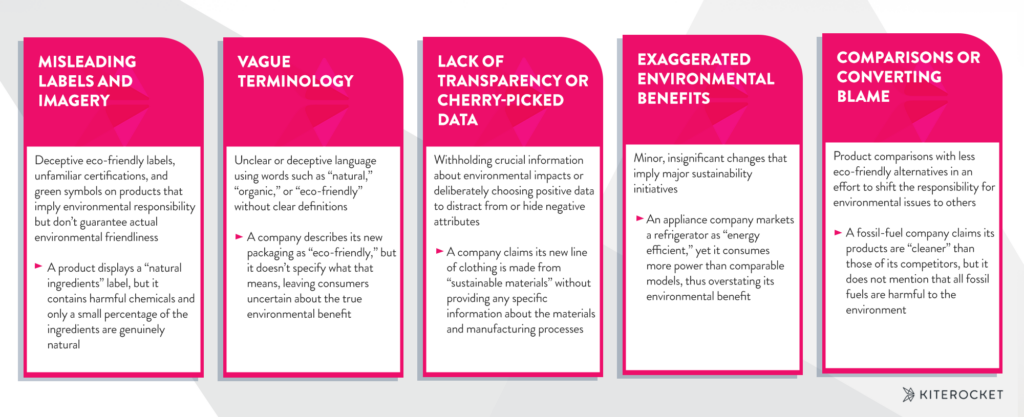What Is Greenwashing?
When you think of “greenwashing,” do you think of green marketing or a company’s impact on the environment? Without context, you might think greenwashing refers to washing an object with a specific type of green-colored soap. Or you might think of washing plants.
When companies are working on their environmental, social, and governance (ESG) initiatives and their corporate sustainability practices, they must understand greenwashing and how to avoid it.
In its simplest terms, greenwashing is when a company or organization falsely claims to be environmentally friendly in its operations. Instead of genuinely committing to sustainable practices, companies will exaggerate or fabricate their green credentials through misleading marketing tactics. The term “greenwashing” was coined to describe this kind of deception.
Prominent Examples of Greenwashing
BP, a multinational oil and gas company, changed its name to “Beyond Petroleum” in 2001 and installed solar panels on many of its gas station roofs. However, in recent years, an environmental group pointed out BP’s misleading advertisements. The company misled the public with its “Keep Advancing” and “Possibilities Everywhere” ad campaigns by focusing on low-carbon energy products when more than 95% of BP’s annual spend is on oil and gas.
In the 2000s, Volkswagen launched its “Clean Diesel” campaign, marketing its diesel vehicles as environmentally friendly. Volkswagen was claiming its vehicles had lower nitric oxide, nitrogen dioxide and better fuel efficiency. In 2015, Volkswagen cars in the US appeared to be meeting or exceeding the regulatory standards of the Clean Air Act while emitting much higher levels of pollutants in real-world driving conditions. It was revealed that Volkswagen had installed software in its diesel vehicles that deliberately manipulated the results of emissions tests.
In 2018, Starbucks introduced a “strawless lid” as a sustainability initiative, claiming it would eliminate plastic straws in its stores by 2020. Although this lid contains more plastic than the previous lid and straw combined, Starbucks stated that, because it’s made from a widely recycled plastic called polypropylene, the new lid is more environmentally friendly. However, critics argued that only 9% of plastics ever get recycled globally and that the US often sends its recycling to developing nations, passing off its responsibility.
Why Do Companies Greenwash?
With the number of infamous greenwashing examples and the public backlash, one might think companies would make a conscious effort not to follow in the same footsteps. Yet, companies still pursue this fake environmental practice – either maliciously or sometimes without knowing – believing that it makes them more appealing to their customers.
There is, in fact, a growing demand for eco-friendly products and services among consumers. According to a 2020 McKinsey & Company survey, 66% of respondents said they consider corporate sustainability when they make a purchase. This puts pressure on companies to find new ways to reduce their environmental footprint so they can promote them in their marketing.
It’s not only about a company’s products or services; it’s also about the brand and how it is perceived in the public eye. Sometimes a company’s desire for consumer approval will blur the lines between what’s ethical and what isn’t, leading a company to adopt greenwashing tactics.
Not all companies are malicious when it comes to greenwashing. It is a concept that can happen by mistake through misunderstanding or a lack of knowledge about true sustainability. That’s why we, as a planet, must understand what real corporate greenwashing looks like.
What Does Corporate Greenwashing Look Like?
It can be challenging to distinguish between genuine sustainability efforts and unreliable claims. To better identify them, we’ve created a visual guide that highlights common tactics companies use when greenwashing.

The Negative Impacts of Greenwashing
Loss of Consumer Trust
Whether you’ve owned a business or not, you know trust is key to lasting customer satisfaction and loyalty. Engaging in greenwashing might get you a small increase in revenue in the short term, but once customers find out they’ve been misled, they will lose trust in the brand – resulting in not only a lost sale, but potentially a lost customer for life. In an age when word of mouth and online reviews can make or break a company, this mistrust can spread rapidly, damaging a brand’s reputation.
Harm to Genuine Green Initiatives
Every time a company falsely claims to be green, it casts a shadow over the entire industry, including those who are genuinely making a difference. Potential supporters or customers might become skeptical of all green claims, making it harder for truly sustainable businesses to get the recognition and support they deserve.
Environmental Harm
The consequences of greenwashing extend beyond business. When misinformation spreads, it can lead to adverse environmental outcomes. For instance, a product falsely marketed as biodegradable might end up in environments where it doesn’t break down, causing harm. Or consumers might think they’re making an eco-friendly choice, when in fact they’re unknowingly contributing to environmental degradation.
How to Avoid Greenwashing
Be Transparent
It isn’t enough simply to label a product or service as “green” or “eco-friendly.” Companies must clearly define what these terms mean in the context of their offerings. For example, if a product is labeled “organic,” it should indicate which of its ingredients are organic and by what percentage. It’s okay to start out small, with the goal to grow your efforts in the future, as long as you communicate that with consumers.
Seek Authentic Certifications
Not all certifications are created equal. It’s crucial for companies to align with certifications and organizations that have a track record of strict standards and rigorous verification processes. For example, in the seafood industry, the Best Aquaculture Practices (BAP) certification covers the entire production chain and follows the four pillars of responsible aquaculture: environmental responsibility, social accountability, food safety, and animal health and welfare. This not only validates a company’s green claims, but also assures customers of their authenticity.
Engage in Genuine Sustainable Practices
True sustainability goes beyond using recyclable packaging or offsetting carbon emissions for a single event; it involves every step of a company’s operations. For example, a company can rethink its supply chain by adopting sustainable sourcing. Other ideas could be incorporating green design principles or setting long-term sustainability goals.
Commit to Continuous Learning and Improvement
The world of green technologies and sustainable business practices is always evolving. To remain genuinely sustainable, companies need to invest in continuing education. This means attending conferences, participating in workshops, and even collaborating with academic or research bodies to stay updated. Hiring a PR team knowledgeable in the field also can help companies stay on top of trends.
Engage with Stakeholders
A company’s green journey shouldn’t be taken in isolation. Engaging with various stakeholders, including customers, employees, and even competitors, can provide valuable insights. Regular feedback loops can be established to understand stakeholders’ perspectives, concerns, and suggestions. This collaborative approach not only enriches the company’s sustainability practices, but also builds trust and community around the brand.
How We Can Help
Avoiding greenwashing is crucial in a company’s sustainable and environmental business practices.
At Kiterocket, our teams are at the forefront of corporate sustainability issues. Industry events, media relationships, CSR/ESG programs, and brand messaging are just a few of the ways we can help companies navigate sustainability practices – and avoid greenwashing. Get in touch with Rebecca Holmes at rebecca@kiterocket.com to learn more about how we can support your efforts.


